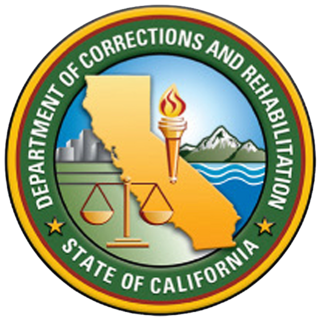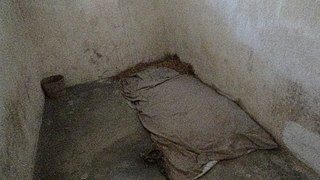Related Research Articles

Solitary confinement is a form of imprisonment in which an incarcerated person lives in a single cell with little or no contact with other people. It is a punitive tool used within the prison system to discipline or separate incarcerated individuals who are considered to be security risks to other incarcerated individuals or prison staff, as well as those who violate facility rules or are deemed disruptive. However, it can also be used as protective custody for incarcerated individuals whose safety is threatened by other prisoners. This is employed to separate them from the general prison population and prevent injury or death.

Pelican Bay State Prison (PBSP) is a supermax prison facility in Crescent City, California. The 275-acre (111 ha) prison takes its name from a shallow bay on the Pacific coast, about 2 mi (3.2 km) to the west.

Incarceration in the United States is one of the primary means of punishment for crime in the United States. In 2021, over five million people were under supervision by the criminal justice system, with nearly two million people incarcerated in state or federal prisons and local jails. The United States has the largest known prison population in the world. It has 5% of the world’s population while having 20% of the world’s incarcerated persons. China, with more than four times more inhabitants, has fewer persons in prison. Prison populations grew dramatically beginning in the 1970s, but began a decline around 2009, dropping 25% by year-end 2021.

The prison abolition movement is a network of groups and activists that seek to reduce or eliminate prisons and the prison system, and replace them with systems of rehabilitation and education that do not focus on punishment and government institutionalization. The prison abolitionist movement is distinct from conventional prison reform, which is intended to improve conditions inside prisons.
Jailhouse lawyer is a colloquial term in North American English to refer to an inmate in a jail or other prison who, though usually never having practiced law nor having any formal legal training, informally assists other inmates in legal matters relating to their sentence or to their conditions in prison. Sometimes, they also assist other inmates in civil matters of a legal nature. The ability that inmates have to help other illiterate inmates file petition for post conviction relief was first recognized in Johnson v. Avery. This same case also determined that unless states provide reasonable alternative, they must permit such action by jailhouse lawyers.
All prisoners have the basic rights needed to survive and sustain a reasonable way of life. Most rights are taken away ostensibly so the prison system can maintain order, discipline, and security. Any of the following rights, given to prisoners, can be taken away for that purpose:
Prison Legal News (PLN) is a monthly American magazine and online periodical published since May 1990. It primarily reports on criminal justice issues and prison and jail-related civil litigation, mainly in the United States. It is a project of the Human Rights Defense Center (HRDC), a 501(c)(3) non-profit organization.
The Columbia Human Rights Law Review is a law review established in 1967 focusing on human rights issues. Named the Columbia Survey of Human Rights Law for its first three volumes, the journal is produced and edited by students of Columbia Law School and is "dedicated to the analysis and discussion of human rights, civil rights, and civil liberties under both domestic and international law." In 2016, the journal launched HRLR Online, an online publication featuring shorter, cutting-edge pieces focusing on human rights.

Lesbian, gay, bisexual, transgender and queer (LGBTQ) people face difficulties in prison such as increased vulnerability to sexual assault, other kinds of violence, and trouble accessing necessary medical care. While much of the available data on LGBTQ inmates comes from the United States, Amnesty International maintains records of known incidents internationally in which LGBTQ prisoners and those perceived to be lesbian, gay, bisexual or transgender have suffered torture, ill-treatment and violence at the hands of fellow inmates as well as prison officials.
Farmer v. Brennan, 511 U.S. 825 (1994), was a case in which the Supreme Court of the United States ruled that a prison official's "deliberate indifference" to a substantial risk of serious harm to an inmate violates the cruel and unusual punishment clause of the Eighth Amendment. Farmer built on two previous Supreme Court decisions addressing prison conditions, Estelle v. Gamble and Wilson v. Seiter. The decision marked the first time the Supreme Court directly addressed sexual assault in prisons.

Jerome "Jerry" Rosenberg was a New York State convict, mobster, and jail house lawyer. He was incarcerated for 46 years, longer than any other prisoner in New York State history. Rosenberg was sentenced to death for his involvement in the 1962 double homicide of two New York City police officers during a robbery carried out with two other Mafia-connected gangsters. His sentence was commuted to life in prison in June 1965, after capital punishment was abolished in New York. Rosenberg went on to become the first New York State inmate to earn a law degree and in turn gave legal advice to several inmates, including the leaders of the Attica Prison riot. A book was written about Rosenberg and his time in prison which was adapted into a 1988, made-for-TV movie, Doing Life, starring Tony Danza.
Ruiz v. Estelle, 503 F. Supp. 1265, filed in United States District Court for the Southern District of Texas, eventually became the most far-reaching lawsuit on the conditions of prison incarceration in American history.

Jalil Abdul Muntaqim is a convicted felon, political activist and former member of the Black Panther Party (BPP) and the Black Liberation Army (BLA) who served 49 years in prison for two counts of first-degree murder. In August 1971, he was arrested in California along with Albert “Nuh” Washington and Herman Bell and charged with the killing of two NYPD police officers, Waverly Jones and Joseph A. Piagentini, in New York City on May 21. In 1975, he was convicted on two counts of first-degree murder and sentenced to life imprisonment with possible parole after 22 years. Muntaqim had been the subject of attention for being repeatedly denied parole despite having been eligible since 1993. In June 2020, Muntaqim was reportedly sick with COVID-19. He was released from prison on October 7, 2020, after more than 49 years of incarceration and 11 parole denials.
Shon Robert Hopwood is an American appellate lawyer and professor of law at Georgetown University Law Center. Hopwood became well-known as a jailhouse lawyer who served time in prison for bank robbery. While in prison, he started spending time in the law library, and became an accomplished United States Supreme Court practitioner by the time he left in 2009.

A prisoner is a person who is deprived of liberty against their will. This can be by confinement or captivity in a prison, or physical restraint. The term usually applies to one serving a sentence in prison.
Ellen M. Barry is an American attorney and public interest lawyer who focuses on prisoners' rights. She was a 1998 MacArthur Fellow.
Prison overcrowding in the United States is a social phenomenon occurring when the demand for space in a U.S. prison exceeds the capacity for prisoners. The issues associated with prison overcrowding are not new, and have been brewing for many years. During the United States' War on Drugs, the states were left responsible for solving the prison overcrowding issue with a limited amount of money. Moreover, federal prison populations may increase if states adhere to federal policies, such as mandatory minimum sentences. On the other hand, the Justice Department provides billions of dollars a year for state and local law enforcement to ensure they follow the policies set forth by the federal government concerning U.S. prisons. Prison overcrowding has affected some states more than others, but overall, the risks of overcrowding are substantial and there are solutions to this problem.

Penal labor in the United States is the practice of using incarcerated individuals to perform various types of work, either for government-run or private industries. Inmates typically engage in tasks such as manufacturing goods, providing services, or working in maintenance roles within prisons. Prison labor is legal under the 13th Amendment to the U.S. Constitution, which prohibits slavery and involuntary servitude, except as punishment for a crime.

In the United States penal system, upwards of 20 percent of state and federal prison inmates and 18 percent of local jail inmates are kept in solitary confinement or another form of restrictive housing at some point during their imprisonment. Solitary confinement (sometimes euphemistically called protective custody, punitive segregation (PSEG) or room restriction) generally comes in one of two forms: "disciplinary segregation," in which inmates are temporarily placed in solitary confinement as punishment for rule-breaking; and "administrative segregation," in which prisoners deemed to be a risk to the safety of other inmates, prison staff, or to themselves are placed in solitary confinement for extended periods of time, often months or years.
Human Rights Defense Center (HRDC) is a non-profit 501(c)(3) organization that campaigns on behalf of prisoner rights across the United States. The organization advocates for the rights of people in "state and federal prisons, local jails, immigration detention centers, civil commitment facilities, Bureau of Indian Affairs jails, juvenile facilities and military prisons." Some of the major focuses of the HRDC include work on free speech issues, government transparency and accountability, as well as opposition to the private prison industry.
References
- ↑ "Current Staff & Board". March 31, 2016.
- ↑ Prisoners' Self-help Litigation Manual . Oceana; 2010. ISBN 978-0-19-537440-7. p. 1–.
- ↑ Social Work Practice and the Law . Springer Publishing Company; 17 October 2011. ISBN 978-0-8261-1766-3. p. 270–.
- ↑ The Comparative and International Law Journal of Southern Africa . Institute of Foreign and Comparative Law, University of South Africa.; 1982. p. 161.
- ↑ Austin Sarat. Merciful Judgments and Contemporary Society: Legal Problems, Legal Possibilities . Cambridge University Press; 31 October 2011. ISBN 978-1-139-50483-6. p. 40–.
- ↑ A Jailhouse Lawyer's Manual . Columbia Human Rights Law Review; 2017. ch. 1 p. 1.
- ↑ Ira P. Robbins. Prisoners and the Law . Vol. 1. Clark Boardman Company; 1985. ISBN 978-0-87632-478-3.
- ↑ "Immigration & Consular Access Supplement". A Jailhouse Lawyer's Manual. March 31, 2016. Retrieved April 15, 2017.
- ↑ "Columbia Law School Journal Day Handbook". April 13, 2015. Retrieved October 25, 2017.
- ↑ "The Jailhouse Lawyer's Handbook: How to Bring a Federal Lawsuit to Challenge Violations of Your Rights in Prison, 4th Edition" (PDF). 2003. Archived from the original (PDF) on May 2, 2023.
- ↑ "The Jailhouse Lawyer's Handbook: How to Bring a Federal Lawsuit to Challenge Violations of Your Rights in Prison, 5th Edition" (PDF). 2010. Archived from the original (PDF) on May 19, 2023.
- ↑ "The Jailhouse Lawyer's Handbook: How to Bring a Federal Lawsuit to Challenge Violations of Your Rights in Prison" (PDF). The Center for Constitutional Rights. 2021. Archived from the original (PDF) on June 22, 2023.